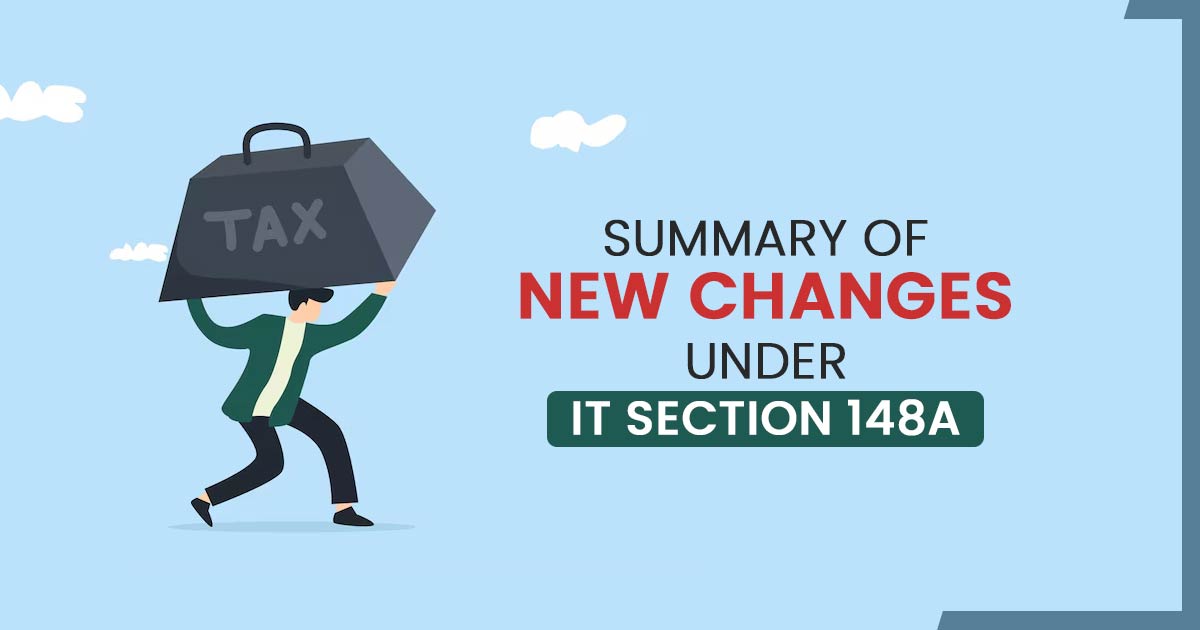
The Finance Bill 2024 includes changes to Section 148A of the Income-Tax (I-T) Act, which relates to the time limits for issuing notices to reopen assessments. Currently, the Income-Tax Department can reopen assessments under Section 148A for up to 5 years and 3 Months from the end of the relevant assessment year if the income exceeds Rs 50 lakh. In contrast, for incomes below Rs 50 lakh, the limit is three years and three months from the end of the relevant assessment year.
However, the time limit remains the same for cases with income below Rs 50 lakh. For the AY 2019-20, if the income escaping assessment is Rs 50 lakh or more, the due date for issuing a notice u/s 148 or an order under Section 148A has been set as 30 June, 2025.
What is Income Tax Section 148A?
Section 148 of the Income Tax Act permits income tax officers to begin reassessment proceedings if they discover that an assessee might have concealed income in any assessment year.
How Much Tax Do You Need to Pay Under I-T Section 148A?
Section 148A cited that the income tax officer must furnish the assessee with an opportunity to elaborate on their matter before issuing the notice. Alternatively, the same furnishes the assessee with a chance to be heard.
The assessing officer could grant a minimum of 7 days and a maximum of 30 days to the taxpayer to provide his/her explanation. If the income tax department suspects tax evasion, it directs a notice u/s 148, intimating the assessee for reopening the matter.
Provisions of I-T Section 148A
In compliance with the provisions shown under section 148A of the Income Tax Act as introduced in the budget of 2021, it is obligatory that in cases where an assessing officer has intelligence related to the income that has not been shown, a specified protocol is to be followed.
Before the issuance of the notice u/s 148, it is incumbent on the said officer to provide the assessee a chance to show their opinion. By serving a show cause notice, it has been accomplished by seeking the taxpayer to provide the reasons mitigating the provision of the problem of a notice u/s 148.
Upon receiving such notification, the taxpayer is responsible for providing a comprehensive response within the given timeframe. Additionally, individuals who are the subject of such inquiries have the right to raise initial objections against the proposed reopening of their case for an evaluation related to potential underreported income.
It is the responsibility of the tax authorities to carefully consider and address these objections methodically through the issuance of a detailed and well-substantiated speaking order.
Latest Amendments in I-T Section 148A
The amendments to section 148A of the Income Tax Act, have been proposed by the Finance Bill 2024, establishing the new time limits to issue the notices. As per the tax experts for income escaping assessment of Rs 50 lakh or more, the Section 148A notice ought to be issued within 5 years from the end of the assessment year.
Notices u/s 148, following a Section 148A notice, have a maximum time limit of five years and three months from the assessment year-end. With effect from September 1, 2024, such changes will come into force.
Major Things to Remember in Section 148A
- Assessments for AY 2019-20 will be limited to the period ending on 30th June 2025.
- On getting a notice u/s 148A, the receiver must validate if the notice was issued within the said time.
- The notice should comprise the related incriminating proof or details that served as the grounds for its issuance. Also, it must derive from the National Faceless Appeal Centre (NFAC) instead of the jurisdictional assessing officer.
FAQ’s Related to IT Section 148A
Q.1 – What is an order under section 148A?
According to the order u/s 148A, the decision of the assessing officer is grounded on the available proof along with the response of the applicant, whether it is appropriate or not to issue the notice for the initiation of income that has not undergone assessment u/s 148.
Q.2 – What is the method to answer a notice under section 148A?
In two ways you can address the notice- one is that you file a tax return or send a written answer to the assessing officer along with all the required information and proof. Submit your return if you agree with the assessing officer’s furnished reasons.
Q.3 – What is the due date to explain the notice u/s 148A?
The assessing officer under section 148A is authorised to furnish the taxpayer a minimum of 7 days and a maximum of 30 days to explain.
Q.4 – What is the distinction between sections 148 and 148A?
Section 148 deals with the notice that the income tax department can furnish against any income that may not have undergone assessment in the earlier assessment years. The income tax department u/s 148A should furnish the taxpayer a chance to explain the cause for not undergoing the assessment.
Q.5 – What impact took place on not answering to section 148A notice within the provided durations?
For an income escape assessment, the assessing officer may issue a notice u/s 148 if they do not get any answer within the said time duration.
Q.6 – What should a person do to prevent issues that might cause an assessment to be reopened u/s 148A?
A Taxpayer on filing returns within the said time can avert the issues of reassessments u/s 148A. They should furnish the sources of income to the income tax department and not hide any information from them.
Q.7 – For reopening an assessment u/s 148A, is there a minimum income amount limit?
Yes, to avert being assessed u/s 148A, there is a minimum amount of income. If the amount of income that does not undergo the assessment is less than Rs 1 lakh, then the income tax department is not permitted to revisit the assessment.









